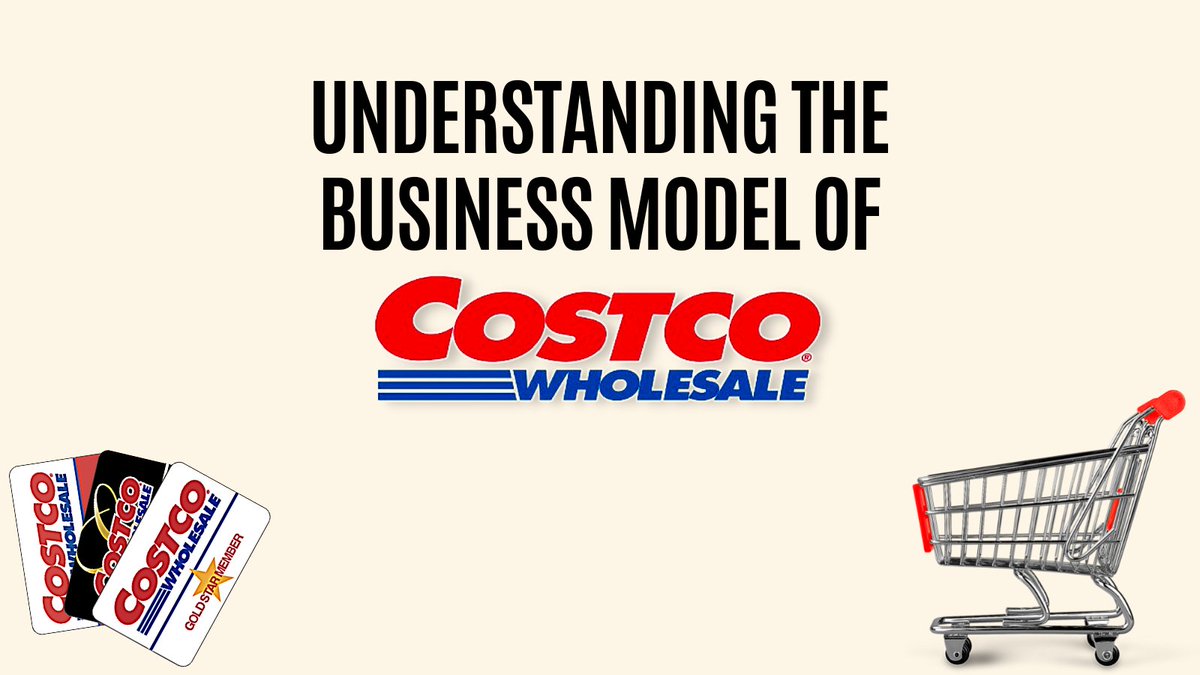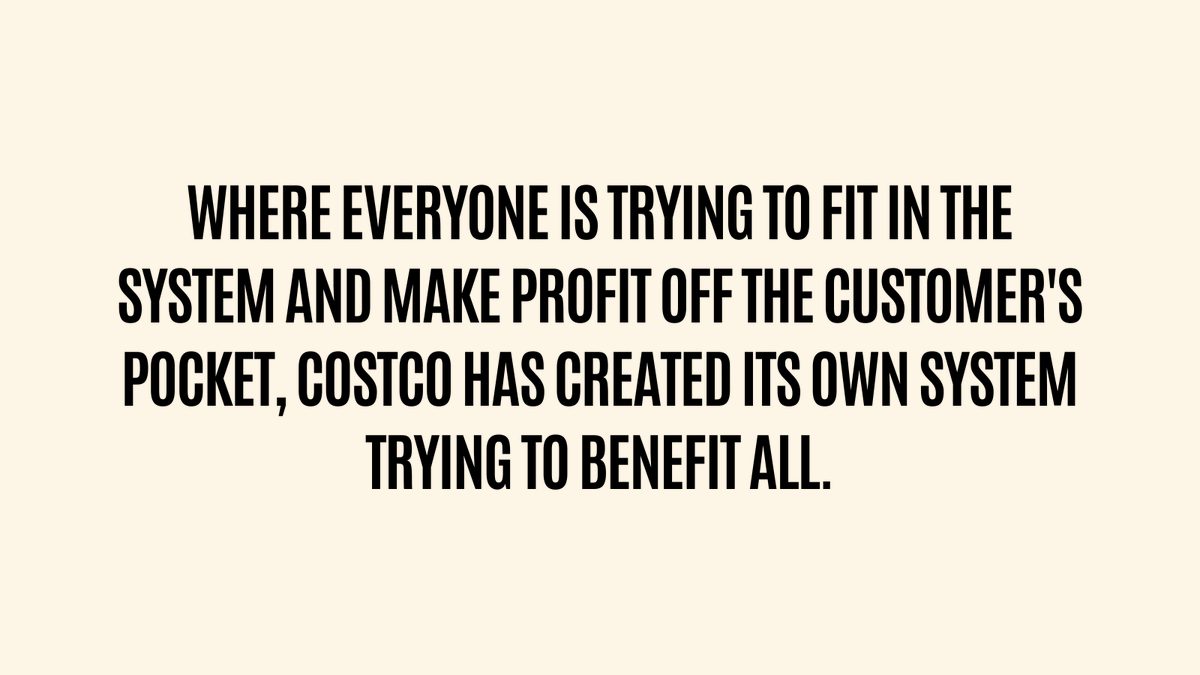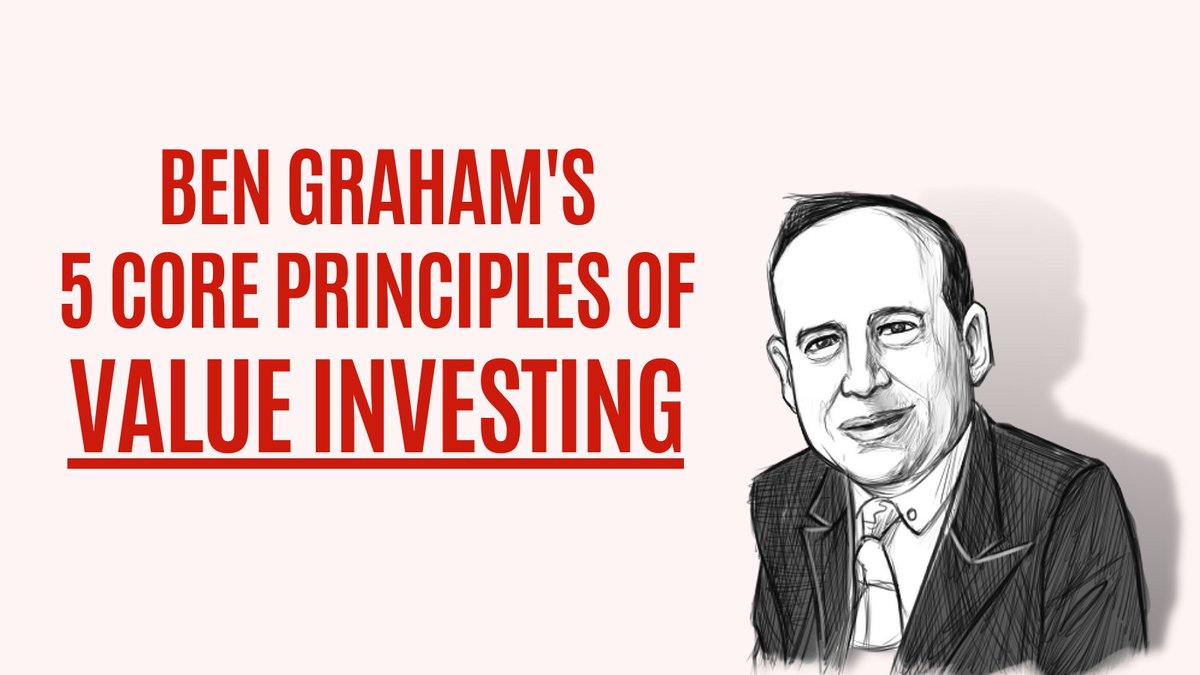
The Story of Costco
How Costco is Thriving in the Competitive Retail Industry While Keeping a Giant like Walmart on its Toes.
Decoded!🕵️
@FI_InvestIndia @Sanjay__Bakshi @Gautam__Baid @unseenvalue @NeerajMarathe @ms89_meet @drprashantmish6 @Investor_Mohit @caniravkaria
🧵👇
How Costco is Thriving in the Competitive Retail Industry While Keeping a Giant like Walmart on its Toes.
Decoded!🕵️
@FI_InvestIndia @Sanjay__Bakshi @Gautam__Baid @unseenvalue @NeerajMarathe @ms89_meet @drprashantmish6 @Investor_Mohit @caniravkaria
🧵👇

Costco is the world’s fifth largest retailer in the world with a net worth of around $ 170 billion. Since the day it got incorporated in 1983, the company has consistently locked horns with Walmart, the largest player in the retail industry.
Despite such relentless competition, the company has created its niche and in the process has managed to churn out billions of dollars in profits for over three decades now.
A retail business is highly competitive in nature with razor thin margins. It is imperative for the incumbent to manage their costs efficiently in order to stay profitable.
Costco has not only managed their costs well, but they have done it better than Walmart.
Costco has not only managed their costs well, but they have done it better than Walmart.

At first glance, Costco stores seem no different from any other retail store like Walmart with its huge shelves jam-packed with products.
But, if you enter its store, you will see a limited brand of a particular product, unlike the other retail stores which provide you with every brand.
At the outset, it may look like a disadvantage, but it is not. Rather, it’s a strategy which has worked very well for them.
At the outset, it may look like a disadvantage, but it is not. Rather, it’s a strategy which has worked very well for them.
They sell limited brands.
There is a concept called Paradox of choice which states that if a person is provided with many options to choose from, it creates stress & confusion in his mind.
It impedes the decision-making process. Thus, causing less happiness & satisfaction.
There is a concept called Paradox of choice which states that if a person is provided with many options to choose from, it creates stress & confusion in his mind.
It impedes the decision-making process. Thus, causing less happiness & satisfaction.
Costco uses this paradox of choice to their advantage by serving only a few brands of supplies for each type of product in their stores.
This resolves the issue that a person faces and helps them in making faster decisions and on the flip side drives up the company’s sales.
This resolves the issue that a person faces and helps them in making faster decisions and on the flip side drives up the company’s sales.

One need not worry about the kind of products available at the store due to the availability of only a limited stock because when it comes to the quality of products, Costco aces that game.
Quality Products
Costco is known for selling high-quality products that stand up to their expensive counterparts. It provides with few but the best quality brands.
It keeps a tab on every item and does not allow any substandard products to enter its gates.
Costco is known for selling high-quality products that stand up to their expensive counterparts. It provides with few but the best quality brands.
It keeps a tab on every item and does not allow any substandard products to enter its gates.
Consumer Reports places Costco's Private-label, Kirkland Signatures, as 6th in customer satisfaction in the nation.
One might think if only high-quality products are available at the store, it must be expensive to shop at Costco.
But in reality, the case is entirely opposite.
One might think if only high-quality products are available at the store, it must be expensive to shop at Costco.
But in reality, the case is entirely opposite.
Increased Bargaining Power
Costco deals in limited brands & buys them in bulk quantities from their suppliers.
Larger orders translate into higher bargaining power with their suppliers and hence, they manage to eke out the best prices in the market for those specific brands.
Costco deals in limited brands & buys them in bulk quantities from their suppliers.
Larger orders translate into higher bargaining power with their suppliers and hence, they manage to eke out the best prices in the market for those specific brands.
It leaves Costco with the low-cost products at their disposal.
But this isn't the only reason behind bargained products offered in the store.
The main reason lies in the Generosity of Costco.
But this isn't the only reason behind bargained products offered in the store.
The main reason lies in the Generosity of Costco.
Costco refuses to increase markup on their products.
Markup is the difference between the cost & the selling price. The avg. markup floats between 20%-40% for wholesalers & distributors.
Costco adds 14-15% margin to provide products at a bargained price far below industry avg.
Markup is the difference between the cost & the selling price. The avg. markup floats between 20%-40% for wholesalers & distributors.
Costco adds 14-15% margin to provide products at a bargained price far below industry avg.

The essence of Costco lies in its one simple strategy: drive better sales. They believe that if sales are good within the store, then everything else will basically just take care of itself. 

Costco: the Best Paymasters in town.
Every hand that touches an item on the shelf (stocking, rearranging, and organizing) costs money to a retail company. However, Costco’s supply chain is rigged to minimize such costs.
Every hand that touches an item on the shelf (stocking, rearranging, and organizing) costs money to a retail company. However, Costco’s supply chain is rigged to minimize such costs.
Their employees deal with fewer brands making it easy for them to manage the inventory efficiently. They interact with limited suppliers, manage fewer invoices, deal in bulk quantities etc.
Hence, Costco requires less staff per store compared to any other retailer in the world.
Hence, Costco requires less staff per store compared to any other retailer in the world.
Costco values their employees above anything else. Their ideology is “Happy employees translate into happy customers”.
The average pay of a retail worker is around $10.88 whereas on average Costco workers earn around $24 (which is nearly 2x Walmart’s current pay rate).
The average pay of a retail worker is around $10.88 whereas on average Costco workers earn around $24 (which is nearly 2x Walmart’s current pay rate).

The employees generate nearly triple the revenue compared to an average Walmart or Target employee.
Ideal work environment and better incentives have helped Costco maintain the lowest employee turnover ratio in the retail industry of just 17%.
Ideal work environment and better incentives have helped Costco maintain the lowest employee turnover ratio in the retail industry of just 17%.

But, if Costco provides products at low margins which are pretty much exhausted in paying its workers and operating expenses. How is it profitable?
How is it surviving in such a competitive world giving a good fight to a company as big as Walmart?
How is it surviving in such a competitive world giving a good fight to a company as big as Walmart?
COSTCO MEMBERSHIP – the major revenue source.
Costco earns by selling Memberships to their customers.
It charges an annual payment from its customers to shop from its store. In order to avail the benefits of shopping, one must apply for their membership card.
Costco earns by selling Memberships to their customers.
It charges an annual payment from its customers to shop from its store. In order to avail the benefits of shopping, one must apply for their membership card.

75% of Costco’s profits come from membership fees which is the prime reason that allows the company to sell its products at little to no margin.
Costco makes a profit even before selling a single product. Membership isn’t a loyalty program for Costco; it is their Business Model.
Costco makes a profit even before selling a single product. Membership isn’t a loyalty program for Costco; it is their Business Model.

As of 2019, Costco had a membership renewal rate of 88% globally which is a phenomenal feat.
Also, the number of memberships that Costco sells every year is on the rise which means they are able to attract a larger customer base through their High quality/Low pricing strategy.
Also, the number of memberships that Costco sells every year is on the rise which means they are able to attract a larger customer base through their High quality/Low pricing strategy.

Thus, Costco has built a powerful business with a huge loyal customer base.
The brilliance lies in its unique business model wherein the profits do not depend on the relentless quest to keep selling more products rather on the company's ability to sell more and more memberships.
The brilliance lies in its unique business model wherein the profits do not depend on the relentless quest to keep selling more products rather on the company's ability to sell more and more memberships.
In essence, when the rest of the retailers are struggling in the race of margins, Costco is running a different marathon altogether.
• • •
Missing some Tweet in this thread? You can try to
force a refresh








